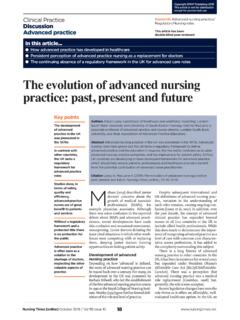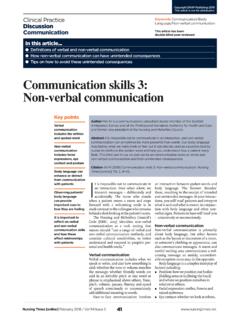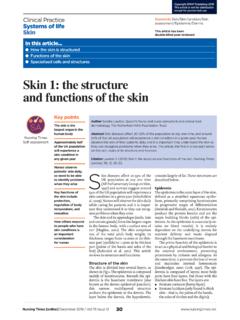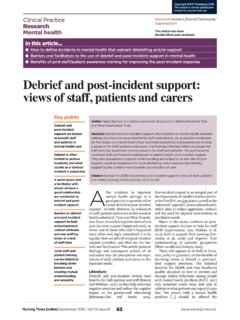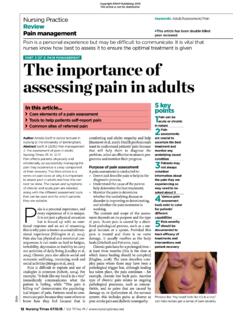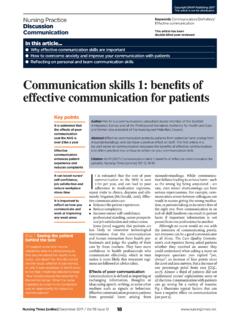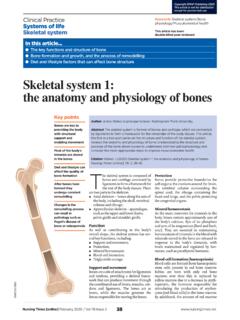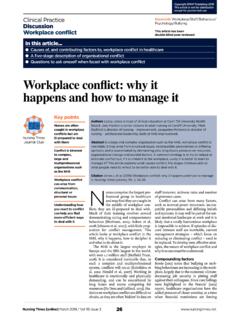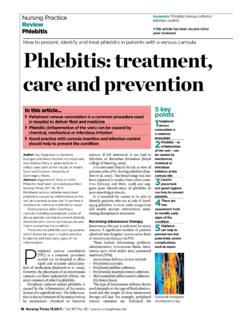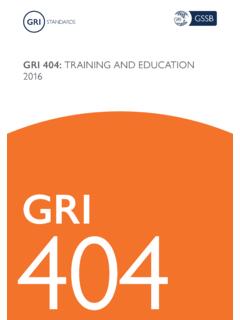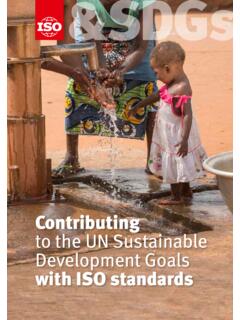Transcription of Nurses’ experiences of transitioning into advanced ...
1 Copyright EMAP Publishing 2020 This article is not for distributionexcept for journal club use35 Nursing Times [online] March 2020 / Vol 116 Issue 3 NHS is facing significant challenges due to financial and political restraints that make high-quality patient care ever more difficult to deliver (Hammond et al, 2017). Decreases in the number of junior doctors and the hours they work, along with a growing population of ageing patients who have comorbidities and complex needs, has led to new measures in an attempt to safeguard the future of healthcare provision (Reynolds and Mor-timer, 2018). This includes the develop-ment of: l advanced practitioner/ advanced nurse practitioner (ANP) roles, involving nurses and allied health professionals taking on responsibilities that were once the preserve of doctors (Ryley and Middleton, 2016);l The role of physician associate, which is open to qualified health professionals and bioscience graduates and involves undertaking a range of tasks and responsibilities under the supervision of a doctor (Curran and Parle, 2018).
2 The most established of these roles is the ANP, which the Royal College of Nursing (2018) has stated should be ful-filled by nurses who are highly skilled, highly educated and able to act with supreme autonomy. Nurses transitioning into this role can find themselves in an unfamiliar world, where the boundaries of nursing and medicine are blurred (Joel, 2013). Any role transition can bring anx-iety, stress and uncertainty (Williams and Sibbald, 2001) and, in the case of ANPs, the changes in responsibility can be so immense that these factors can inhibit development (Barnes, 2015a). Role transi-tion is recognised as a complex process (Meleis et al, 2000) and theory around it proposes conditions that can lead to both positive and negative transition experi-ences (Chicca and Bindon, 2019)In historical terms, the role of the ANP is still relatively new, and there is a lack of.
3 Keywords career development /Role transition/ advanced nurse practitioner This article has been double-blind peer reviewedKey points The NHS is investing in advanced practitioner roles, where nurses take on tasks traditionally carried out by doctors Despite the enormity of the change, there has been little research into the experiences of nurses transitioning into advanced practice Greater autonomy, skills development and providing advanced diagnosis and treatment makes the role of advanced nurse practitioners rewardingDifficulties with transition include a perceived loss of seniority and professional identityStructured training and mentoring by nurses in advanced practice roles could improve the transition experienceNurses experiences of transitioning into advanced practice rolesAuthors Kevin Mannix is MSc advanced practice student; Colin Jones is senior lecturer/researcher in clinical research methods/adult nursing; both at Liverpool John Moores The NHS is aiming to relieve the shortfall of junior doctors by investing in advanced nurse practitioners and training nurses to perform those tasks that have, traditionally, been performed by doctors.
4 There is little information on nurses experiences of transitioning from general to advanced practice, so a qualitative study was undertaken to gauge the feelings and views of six trainee advanced nurse practitioners on an acute medical ward in a busy city hospital. Although job satisfaction was high, participants feared losing their nursing identity and found the transition process stressful. They identified a need for more structured training and mentoring support from nurses already trained as advanced practitioners to ease the transition Mannix K, Jones C (2020) Nurses experiences of transitioning into advanced practice roles. Nursing Times [online]; 116: 3, this Evidence on nurses transition into advanced practice roles l Trainee advanced nurse practitioners views about their experiences of transitionl What is needed to improve the transition experienceClinical PracticeResearchAdvanced practiceCopyright EMAP Publishing 2020 This article is not for distributionexcept for journal club use36 Nursing Times [online] March 2020 / Vol 116 Issue 3 knowledge and proficiency in a range of clinical procedures, and each was assigned to a medical consultant who was responsible for deeming them competent to practise.
5 The expected length of training was 2-3 years. The trainee ANPs in this study were at various stages: three were nearing the end of their training and the other three had been in post for almost 12 months. All had previously worked in senior nursing roles, including as matron, nurse practitioner and specialist nurse , and had 10-25 years experience in interviews are preferred in qualitative research (Ellis, 2016), but such a process was considered too time con-suming for a bustling acute medical ward. As a result, participants attended semi-structured interviews, each lasting 30 min-utes, at their place of work. The interviews were conducted face-to-face in a secure office at a time convenient to the partici-pant. Questions focused on participants :l Understanding of the role;l Training experiences ;l Professional identity. These have been detailed in Box 1.
6 Answers were recorded, before being transcribed and numbered by the researcher, who then deleted the recording. Each transcript was analysed for reccurring words and phrases, which were then coded and grouped into themes, before being compared to seek common lines of thought. Limitations and ethicsIt is important to acknowledge that the interviewer was also a trainee ANP. Being an insider can enhance a study by allowing a greater understanding of the phenomenon being studied (Bonner and Tolhurst, 2002), but can also raise con-cerns about insider bias (Greene, 2014). To protect against bias, interview questions were open-ended, allowing participants to express themselves freely and without coercion. Participants were also invited to check the completed transcript of their interview, with an experienced researcher supervising the process.
7 Although the sample size was small and interviews were short, the qualitative nature of the study meant there was no intent to generalise or to prove any par-ticular hypothesis. The project was approved by the Health Research Authority and ethical approval was received from the participants employers and the university for which the study was undertaken. Participants received an information leaflet outlining the study, interview from an acute medical unit in a busy city-centre hospital in England, where they assessed, diagnosed and initiated treatment for patients presenting as med-ical emergencies with acute illness under the supervision of medical colleagues. Trainee ANPs were invited to join the study by email after permission had been secured from their employing trust and line manager, who acted as gatekeeper.
8 The only criteria for inclusion was being a trainee ANP; there were no exclusions on grounds of gender, age or years of nursing experience . All six trainee ANPs on the unit agreed to be interviewed; this was more than the minimum of three partici-pants acceptable for this type of study, as outlined by Robinson (2013). The hospital-based training programme required trainee ANPs to complete a port-folio of competencies to demonstrate l Role clarity;l Standardisation across the spectrum of ANPs;l Equal training has led to concerns about whether the successful transition of the first ANPs in the 1990s can be sustained (Corbally and Lees-Deutsch, 2019). ANPs are pioneering changes to the medical landscape and nurses transi-tioning from traditional to advanced roles need to have their voices heard to inform the content of future training pro-grammes.
9 This article describes a study to capture the thoughts and feelings of nurses as they transition into reviewA literature search was made using the CINAHL, Medline, Embase, PsycINFO, Healthcare Management Information Consortium and Health Business Elite databases. Entering the search term advanced nurse practitioner returned 320 publications; these reduced to 174 after duplicates were removed. However, few of the articles focused on the thoughts and feelings of trainee ANPs or offered explor-atory data of their personal journeys moving between qualitative evidence synthesis by Moran and Nairn (2017) highlighted 11 international studies dating from 1998 encompassing the transition to advanced roles by nurses and allied health profes-sionals that included evidence of worry and fear among this cohort.
10 A study of Dutch trainee ANPs by Maten-Speknijder et al (2015) found they experienced a crisis of confidence and loss of professional identity , and identified six key areas for improvement in training programmes to alleviate negative transition experiences . These included: l Providing mentorship;l Better orientation and understanding of the role;l Robust training in clinical research is the best way to observe human emotion, and experience and record participants lived experience in a health setting (Galvin and Holloway, 2015). This approach was used to capture the experiences of a small group of nurses tran-sitioning to advanced practice, with data gathered using semi-structured most-appropriate candidates were recruited through purposive sampling to ensure the data captured was as useful as possible. Six trainee ANPs were selected for Clinical PracticeResearchBox 1.
